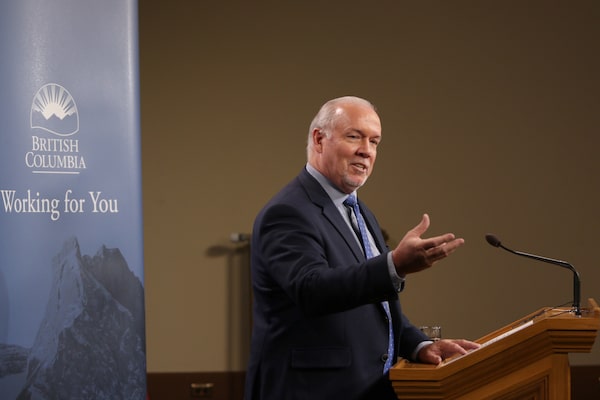
Premier John Horgan, seen here holding his first press conference of the year at B.C. Legislature on Jan. 13, 2020, acknowledged that there are challenges, particularly in forestry, but listed off the province’s advantages – a low carbon profile, strong infrastructure, a skilled work force and a commitment to reconciliation with Indigenous peoples.CHAD HIPOLITO/The Canadian Press
Michael Goehring was in the audience last week when British Columbia’s Premier delivered a mostly upbeat speech to the Natural Resources Forum in Prince George.
Mr. Goehring is president and chief executive officer of the Mining Association of BC, one of the key industries represented – along with oil and gas and forestry – that has been hammered in the past year, and he wanted to hear what Premier John Horgan was going to do to help.
“I have never been more optimistic about B.C.’s future,” the Premier told the conference.
Yes, Mr. Horgan acknowledged, there are challenges, particularly in forestry. But he listed off the province’s advantages – a low carbon profile, strong infrastructure, a skilled work force and a commitment to reconciliation with Indigenous peoples. He highlighted the efforts his government is making to get more jobs out of each tree that is cut, to encourage mining investments and to provide services to the rural communities where those sectors operate.
Until now, those advantages may have been enough to keep the economy humming. His NDP government, in power since 2017, has enjoyed solid economic growth – relative to the rest of Canada – that has allowed it to pursue its agenda to tackle poverty and climate action, and to make life more affordable for ordinary British Columbians.
Now, there are signs the economy is weakening and the catalogue of risks is growing.
Mr. Goehring and other business leaders are looking for some recognition of those factors in the B.C. budget that will be introduced on Feb. 18.
The mining sector’s chief complaint, which is shared by other energy-intensive export industries, is the B.C. carbon tax, which their competitors in other provinces don’t pay. The tax will rise on April 1.
There are other aggravations, too. “B.C.'s 17 operating mines need to see government take action on the regulatory front,” Mr. Goehring said in an interview. “We have some of the highest standards in the world, we have a very strong regulatory regime, but it has become too complex, too costly. And it takes too long to obtain a permit.”
The signs of softening in the province’s natural resources sector began in the second half of 2019.
Jock Finlayson, chief policy officer for the Business Council of B.C., recently crunched the province’s employment statistics for last year. He found the number of forestry and logging jobs shrank by almost 10 per cent. Employment in mining and oil and gas dropped by more than 7 per cent.
Those declines reflect a combination of factors: international trade disputes, volatile commodity prices, weak markets, increasing regulation and rising taxes. Add to that, a growing recognition of environmental concerns, climate change and Indigenous rights, and you have a recipe for uncertainty, not optimism.
Policy makers should be alarmed, Mr. Finlayson says. And he’ll be watching the budget to see what they will do about it.
“We need a medium-term agenda for prosperity in B.C., which looks at the health of the business climate, ensuring we’re attracting investment, that we raise productivity over time,” he said in an interview.
The key signal would be a break on the carbon tax for trade-exposed, energy-intensive sectors, he said. He added that Ottawa offers such relief, which is provided in those provinces where the federal government has imposed carbon pollution pricing.
If the Premier is considering such a change, he gave no hint in Prince George.
Mr. Horgan said his government is already taking action to speed up the permit process for mines and offers new tax credits for mineral exploration. For forestry, his government is delivering transition services for workers affected by mill closings and is easing the financial burden for companies.
A bigger shift in forestry is needed, the Premier said – but it is not the relief that companies are asking for. He told the forum that industry cannot continue with the practice of high-grading forests – taking the most valuable trees and leaving the rest to rot – because its not sustainable.
“We’re not going to magically find more trees," he said. "We need to ensure that we’re adding more value to our wood products when we take them out of the forest, and we need to make sure that when we add that value, we’re including communities, Indigenous people and workers.”
Mr. Horgan assured his audience in Prince George that “we’re ready to work with you to grow B.C.’s natural-resource sector.” His next budget will demonstrate how that relationship will work.